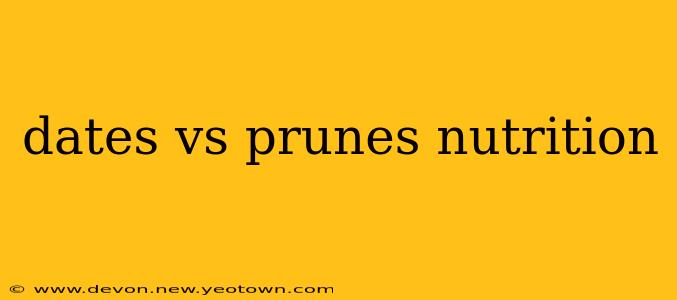Dates vs. Prunes: A Nutritional Showdown for Your Sweet Tooth
The battle of the dried fruits is on! Dates and prunes, both deliciously sweet and chewy, often grace our snack tables and baking dishes. But which one reigns supreme in the nutrition department? Let's delve into a comprehensive comparison, exploring the nutritional profiles of these dried delights and answering some frequently asked questions.
Our story begins in the sun-drenched orchards of the Middle East, where the date palm has thrived for millennia. Meanwhile, across the globe, prune plums flourish under the Mediterranean sun, their wrinkled, dark forms a testament to their rich history. Both fruits, once dried, offer a concentrated burst of flavor and nutrients, but their nutritional compositions differ in fascinating ways.
Dates: The Desert Jewel
Dates are renowned for their naturally high sugar content, offering a quick energy boost. But don't let that fool you; they're far from a simple sugar bomb. Dates contain a variety of essential vitamins and minerals, including potassium, magnesium, and vitamin B6. They're also a good source of dietary fiber, contributing to digestive health and feelings of fullness. Think of them as nature's energy bar, perfect for a pre-workout snack or a midday pick-me-up.
Prunes: The Digestive Dynamo
Prunes, on the other hand, are often lauded for their laxative properties. This is thanks to their high fiber content, particularly insoluble fiber, which adds bulk to the stool and promotes regular bowel movements. Beyond their digestive benefits, prunes are an excellent source of antioxidants, particularly polyphenols, which are linked to various health benefits, including reduced inflammation and improved heart health. These little powerhouses are often overlooked, but their nutritional profile is nothing to sneeze at.
What are the main differences between dates and prunes in terms of nutrition?
The key difference lies in their fiber content and the types of sugars they contain. Prunes generally boast a higher amount of fiber, particularly insoluble fiber, making them more effective for digestive regularity. Dates contain a higher proportion of natural sugars, which provides a faster energy source but might not be suitable for everyone, especially those watching their sugar intake.
Are dates or prunes better for weight loss?
Both dates and prunes are calorie-dense due to their dried nature. However, their fiber content contributes to satiety. Choosing either one in moderation as part of a balanced diet can be beneficial for weight management. The fiber helps you feel full, preventing overeating. Keep in mind that portion control is key with both.
Which fruit is better for blood sugar control?
While both contain natural sugars, prunes tend to have a lower glycemic index (GI) than dates. This means that prunes cause a slower and less dramatic rise in blood sugar levels compared to dates. Individuals with diabetes or those managing their blood sugar should opt for prunes over dates. Always consult your doctor or a registered dietitian for personalized advice on managing blood sugar.
Which one has more antioxidants?
Both dates and prunes offer a good dose of antioxidants, but studies suggest that prunes might have a slightly higher concentration of certain types of antioxidants, specifically polyphenols. These antioxidants play a vital role in protecting cells from damage caused by free radicals.
Conclusion: A Matter of Preference and Needs
The "better" fruit depends entirely on your individual needs and preferences. If you need a quick energy boost and enjoy a sweeter taste, dates might be your go-to. If digestive health is your priority, or if you're watching your blood sugar, prunes could be the superior choice. Both offer valuable nutrients and can be incorporated into a healthy diet. The key is moderation and diversity – enjoy both as part of a balanced eating plan.

